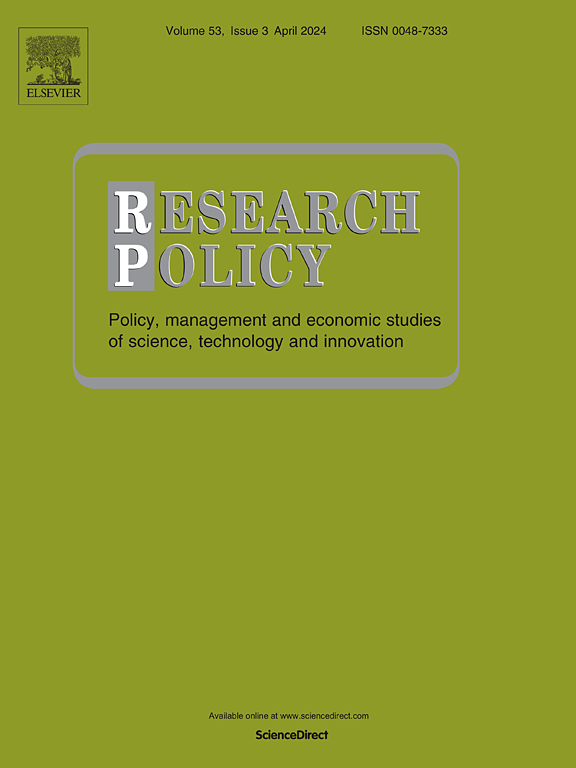早期失败程度对创业转向和成功的影响:来自众筹的证据
IF 8
1区 管理学
Q1 MANAGEMENT
引用次数: 0
摘要
面对早期的失败,企业家们往往会转向他们刚刚起步的企业。虽然经历过的失败的性质可能在决定企业家如何应对方面起着至关重要的作用,但不同的失败经历如何影响企业家从事不同类型的支点仍不清楚。本研究探讨了失败程度如何影响企业家参与市场定位支点的程度,通过针对不同的客户群体,和/或在活动叙事支点中,他们改变了关于企业如何满足相关客户需求的叙事。利用8262对众筹活动的数据,我们研究了早期失败的程度如何影响企业家参与这两种类型的支点的程度。每对众筹活动都由一个最初失败的活动和一个随后在Kickstarter的奖励众筹平台上进行的活动组成。我们还探讨了这些支点对后续众筹活动成功的影响。我们的研究结果表明,失败越大,叙事支点就越实质性,而市场定位支点的可能性只有在经历非常严重的失败后才会大大增加。与我们的预期相反,这两个支点都与随后的竞选成功负相关。事后分析显示,当企业家转向时,他们倾向于远离成功活动的策略,而不是变得更像成功的活动。这一探索性研究的结果强调了失败经验在理解不同类型的创业支点中的重要作用。他们还建议,研究人员可能需要重新审视一个被广泛接受的假设,即从失败的位置转向本质上提高了企业成功的机会。本文章由计算机程序翻译,如有差异,请以英文原文为准。
The effect of the degree of early-stage failure on entrepreneurial pivoting and success: Evidence from crowdfunding
Entrepreneurs often respond to early-stage failure by pivoting their nascent ventures. While the nature of the experienced failure is likely to play a crucial role in determining how an entrepreneur will respond, it remains unclear how different failure experiences influence entrepreneurs to engage in different types of pivots. This study explores how the degree of failure affects the extent to which entrepreneurs engage in market positioning pivots, by targeting a different customer segment, and/or in campaign narrative pivots, where they change the narrative about how the venture will fulfil a relevant customer need. Using data from 8262 crowdfunding campaign pairs, each consisting of an initial failed campaign and a subsequent campaign on Kickstarter's reward-based crowdfunding platform, we investigate how the degree of early-stage failure affects the extent to which entrepreneurs engage in these two types of pivots. We also explore the impact of these pivots on subsequent crowdfunding campaign success. Our findings indicate that the greater the failure, the more substantial the narrative pivot, whereas the likelihood of a market positioning pivot only greatly increases after experiencing very severe failures. Contrary to our expectations, both pivots are negatively associated with subsequent campaign success. Post-hoc analyses reveal that when entrepreneurs pivoted, instead of becoming more similar to successful campaigns, they tended to move away from the strategies of successful campaigns. The findings of this exploratory study highlight the important role of the failure experience in understanding different types of entrepreneurial pivots. They also suggest that researchers might want to revisit the widely held assumption that pivoting away from a failing position inherently improves a venture's chances of success.
求助全文
通过发布文献求助,成功后即可免费获取论文全文。
去求助
来源期刊

Research Policy
MANAGEMENT-
CiteScore
12.80
自引率
6.90%
发文量
182
期刊介绍:
Research Policy (RP) articles explore the interaction between innovation, technology, or research, and economic, social, political, and organizational processes, both empirically and theoretically. All RP papers are expected to provide insights with implications for policy or management.
Research Policy (RP) is a multidisciplinary journal focused on analyzing, understanding, and effectively addressing the challenges posed by innovation, technology, R&D, and science. This includes activities related to knowledge creation, diffusion, acquisition, and exploitation in the form of new or improved products, processes, or services, across economic, policy, management, organizational, and environmental dimensions.
 求助内容:
求助内容: 应助结果提醒方式:
应助结果提醒方式:


